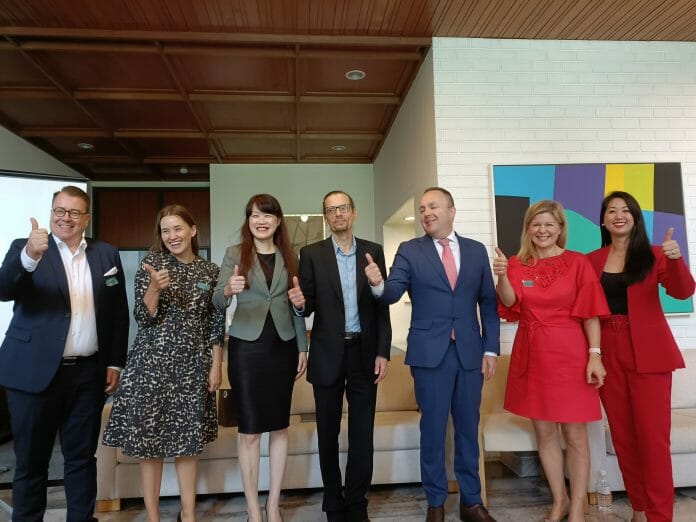Finland’s HEI Schools has identified Malaysia as a key market in its expansion plans.
The global value of ECE is projected to rise to USD 520 billion by 2028, at a compounded annual growth rate (CAGR) of 15%, and HEI Schools is inviting prospective licensees to operate its flagship HEI Schools Learning Centre in Malaysia.
The expansion of the HEI Schools makes the highly successful Finnish education model accessible across the world. Finland is consistently been ranked as one of the top countries in the world with the best education, and has also been ranked No 1 in the World Happiness Index for the fifth consecutive year.
“A high stress environment impairs learning. In HEI Schools, we believe in the holistic development of each individual child – this goes beyond just cognitive development.
“We want to make high-quality early childhood education globally available. Our model is scalable and easy-to-implement, offering the curriculum, teacher training, learning environment design, carefully selected learning materials and operational support needed to start a premium early learning centre,” said Prof Lasse Lipponen, Professor of ECE at the University of Helsinki and co-founder of HEI Schools.
Prof Lipponen was speaking at a panel discussion titled “The Finland Story: Exporting the Secrets of Happiness and Academic Success via a Dynamic Early Childhood Education Model”. Also on the panel of speakers are Anna Korpi, counsellor for Education and Science, Embassy of Finland and Stella Lau, managing director of SEGi University and Colleges.
Finland Ambassador to Malaysia, Sami Leino, hosted the panel discussion at his residence in Kuala Lumpur yesterday (20 Sept 2022).
Prof Lipponen said HEI Schools, which is co-founded by the University of Helsinki, adopts a research- based approach with creative, high-level teacher training and continuous pedagogical improvements.
“Finland’s education system is recognised as one of the best in the world, and we are intent on sharing our success with the rest of the world. We believe in more and more collaboration, and we want to share our expertise. And through collaboration, we also learn from our experiences to enhance our education model further,” said Korpi.
Besides the HEI Schools Learning Centres, HEI Schools also offers its HEI Schools Toolkit, a digital curriculum from Finland, to existing preschools. It has also developed a HEI Schools Teacher Diploma to ensure a steady supply of talented teachers are empowered to nurture our future generations.
With a presence in six continents, HEI Schools is exporting Finland’s world-class ECE model to the world. The HEI curriculum is based on the Finnish national curriculum for ECE & care, and latest pedagogical research. The HEI curriculum has been packaged into concrete inspiration packages, ready to be licensed all over the world together with extensive teacher training, Nordic space design and operational support.
The first HEI School Learning Centre was established in 2017. There are 20 premium HEI Schools Learning Centres located in 6 continents around the world, with another 12 about to open soon. Closer to home, 2 Learning Centres have already been established in neighbouring Bangkok and Jakarta, while two new centres are scheduled to open in Ho Chi Minh City and Phuket within the next 12 months.
While the flagship Learning Centre has yet to be established in Malaysia, approximately 20 preschools and kindergartens have adopted the HEI Schools Toolkit in the past two years. To date, more than 80 preschools and kindergartens in the world have adopted the HEI Schools curriculum. Despite the impact of the pandemic, some of these preschools have reported a double-digit growth in enrolment after subscribing to the Finnish syllabus.
The HEI Schools Teacher Diploma programme has also made its debut in Malaysia last year following a partnership with SEGi University and Colleges. In April this year, HEI Schools entered a similar agreement with Kompas International College in Ipoh to offer the HEI Schools Teacher Diploma. There are currently 150 undergraduates enrolled in Malaysia.
“Early childhood educator is an expert profession. Not everyone can do that,” said Prof Lipponen, adding that in Finland, the minimum requirement to be a preschool teacher is a Bachelor’s Degree while preschool principals must possess a Master’s Degree.
“That’s the way we want to see the progress globally as well. Research shows the increasing importance of early childhood education to a child’s development. By the time you reach primary school, it is too late,” he added.
Alarmingly, the Ministry of Higher Education of Malaysia, back in 2012, revealed that 93% of Malaysian preschool teachers vare without any formal training.
Lau said the new generation of Asian parents are more aware of the importance of holistic development, moving away from solely focusing on cognitive development.
“There are many things that teachers can do better in ECE. And teaching ECE is more complex today. During the lockdowns due to the COVID-19 pandemic, parents had to resort to home teaching and they realise how difficult it is. They have learnt not to take preschool teachers for granted,” she said.
Korpi concurred that teachers must be “the most capable”, not just in academic success but also their mindset and aptitude.
“We leave our children with them every day. We should screen them more strictly than we screen doctors,” she said.









